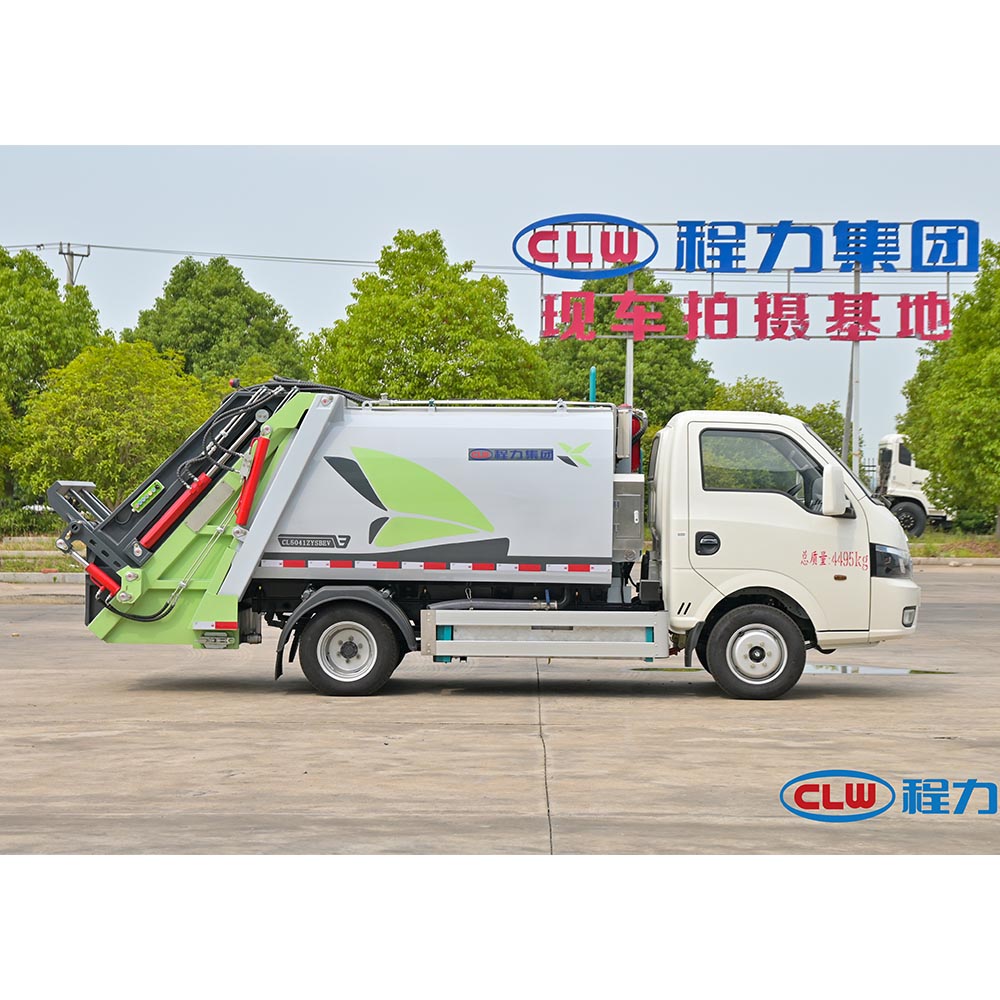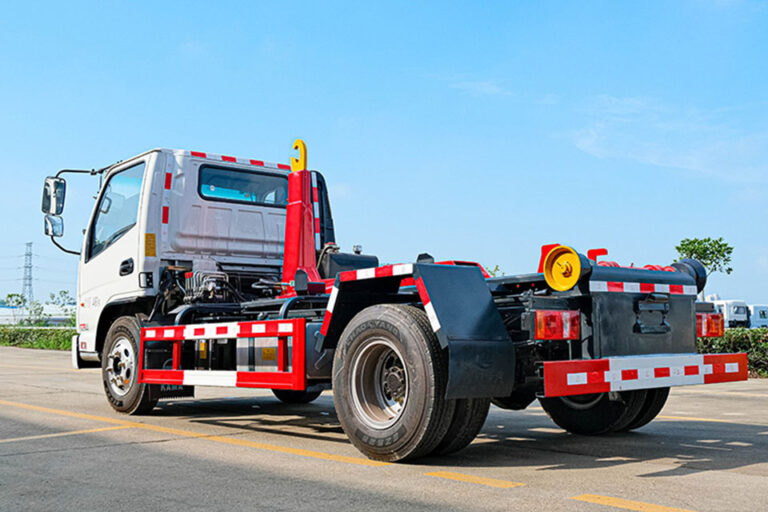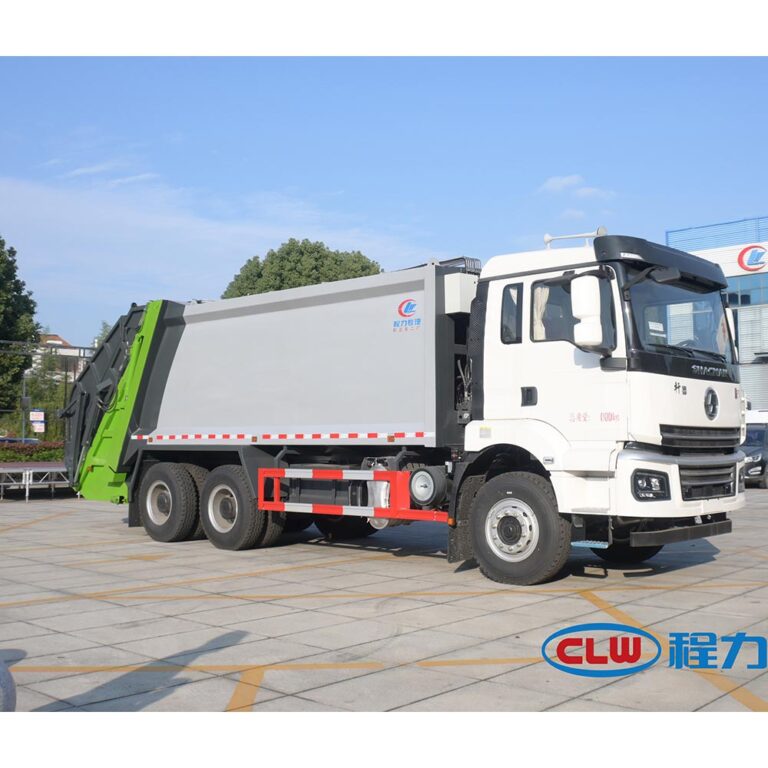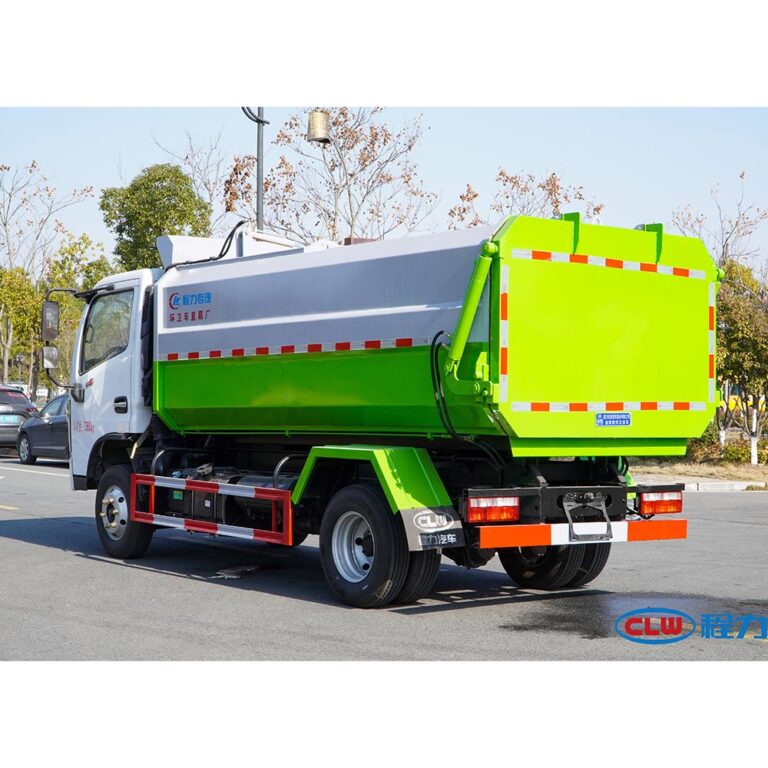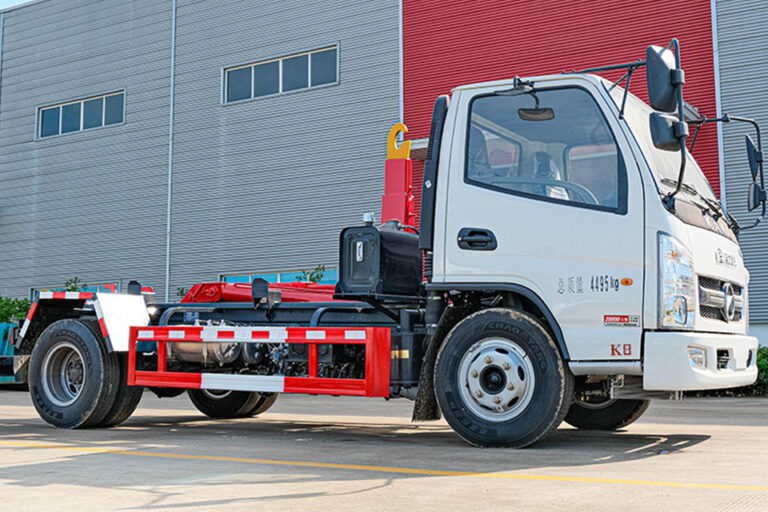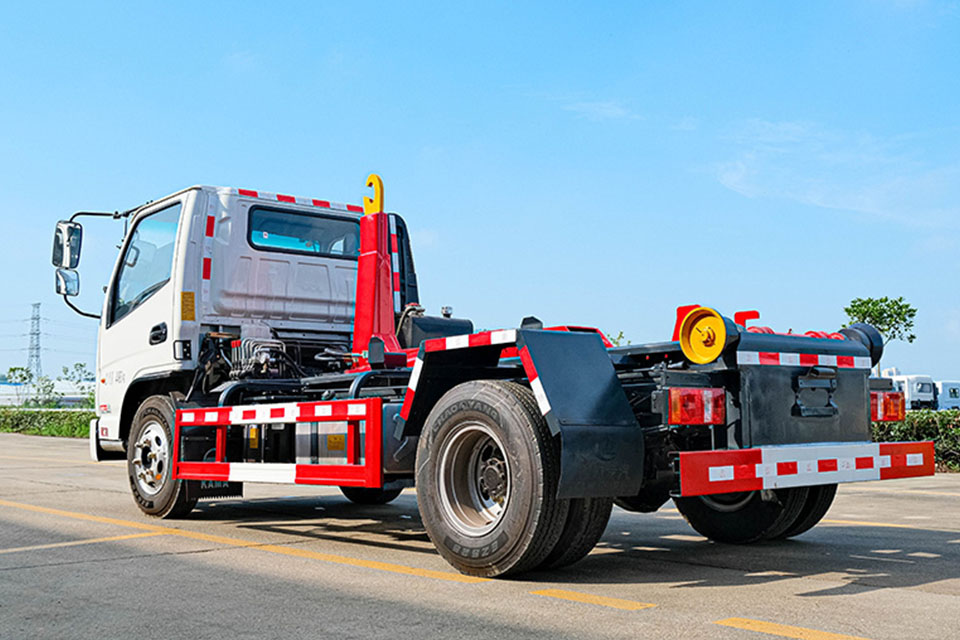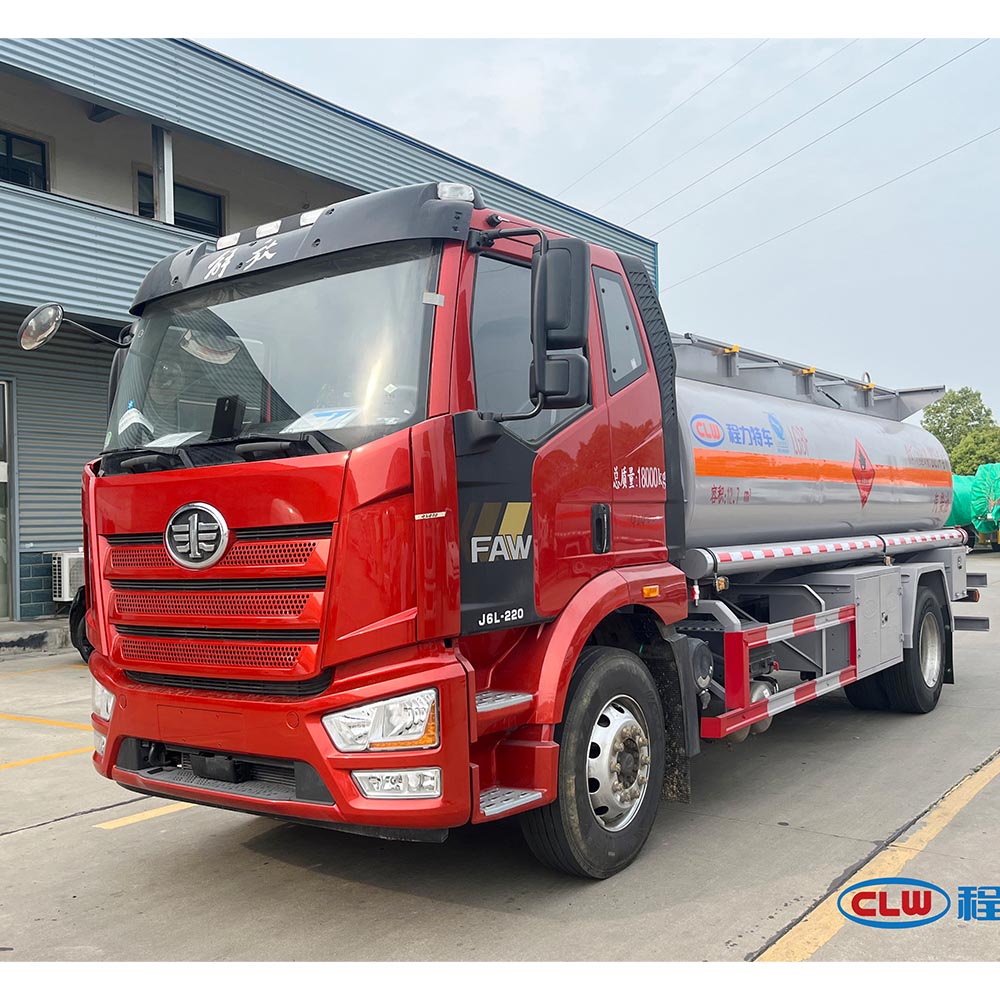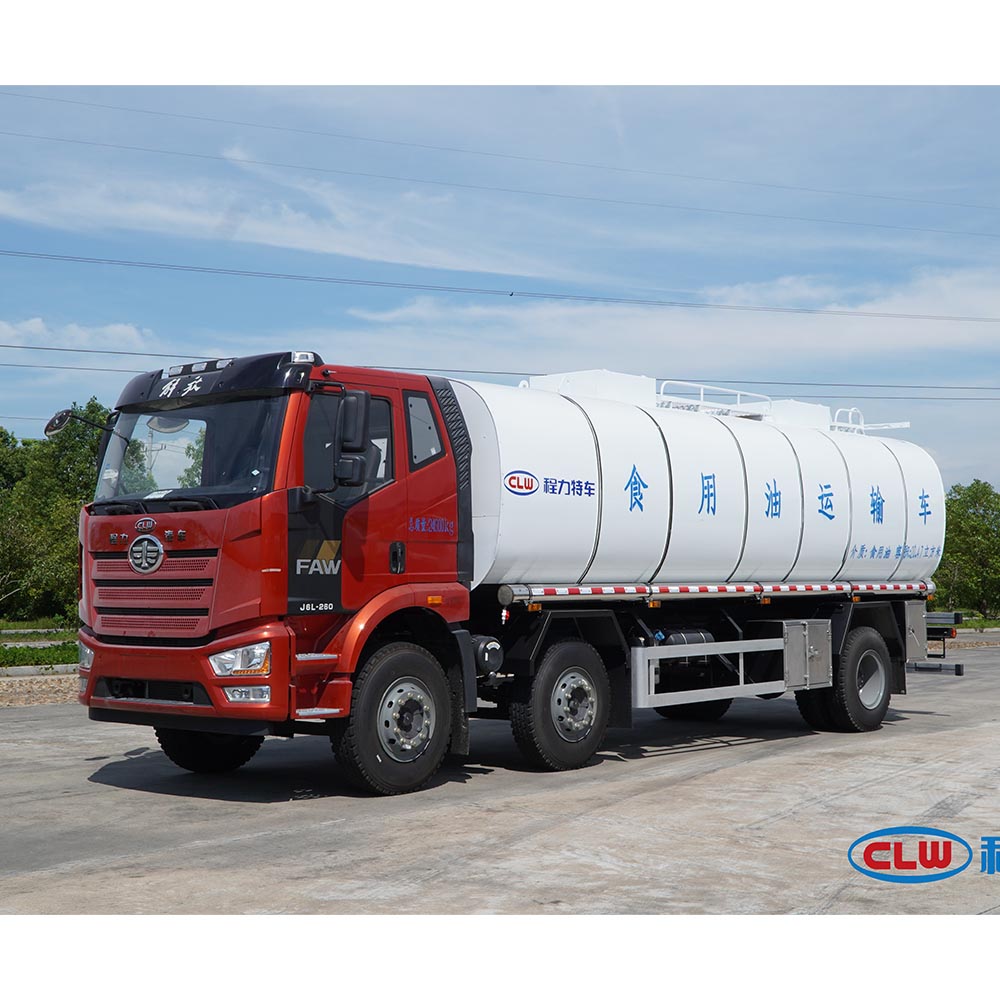-
Parc industriel automobile de Chengli
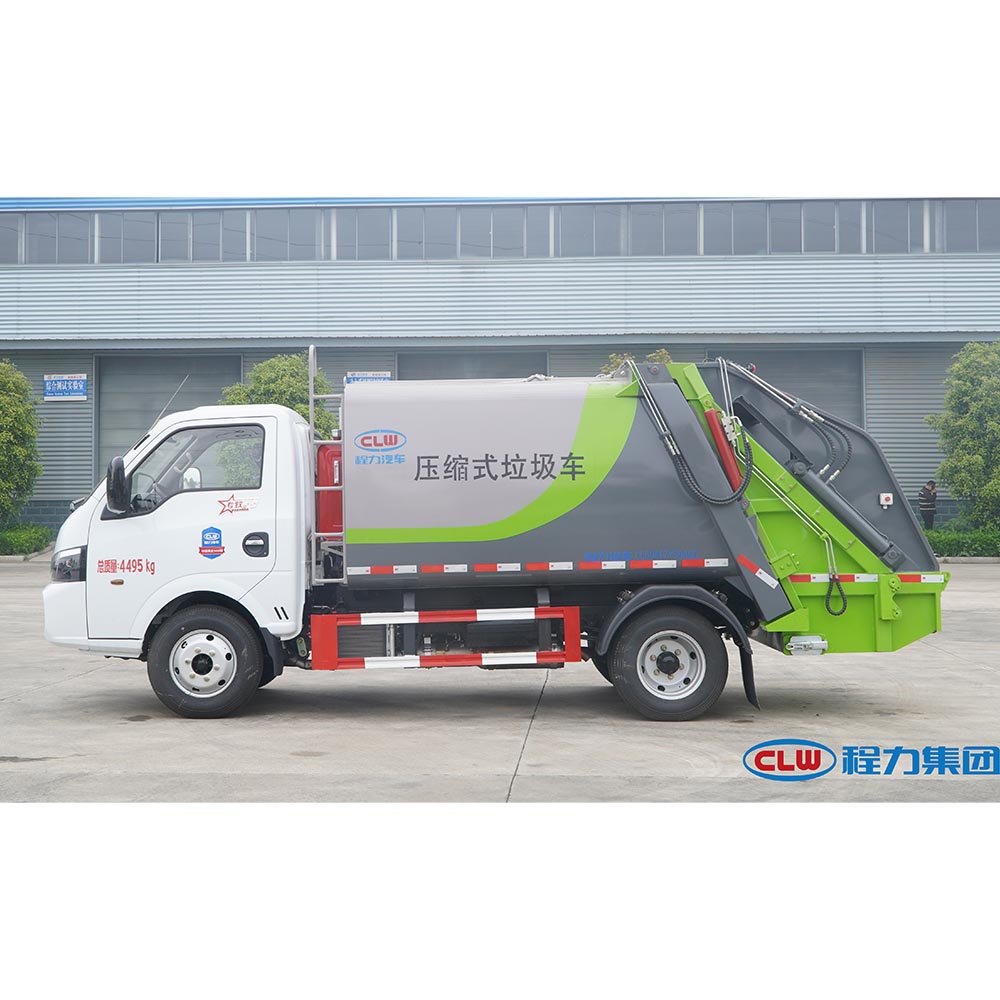
Qu'est-ce qu'un petit camion à ordures ? Combien de types existe-t-il ?
Naviguer dans le monde des camions à ordures : Un guide complet pour une collecte efficace des déchets
Cet article plonge dans le monde fascinant des camions à ordures, en explorant les quatre types les plus courants et en soulignant leurs caractéristiques et applications uniques. Que vous soyez un professionnel chevronné de la gestion des déchets ou simplement curieux de connaître ces véhicules essentiels, cette lecture vous apportera des informations précieuses sur l'optimisation des processus de collecte des déchets et sur le choix du camion adapté à vos besoins. En tant que représentant d'une usine de fabrication de bennes à ordures ménagères compressées, je suis ravi de partager mon expertise et de vous aider à comprendre le rôle crucial que jouent ces camions dans les systèmes modernes de gestion des déchets.
Table des matières
1. Quels sont les quatre types de camions à ordures les plus courants ?
Les camions à ordures jouent un rôle essentiel dans notre vie quotidienne, en éliminant silencieusement et efficacement les déchets de nos maisons et de nos entreprises. Mais saviez-vous qu'il existe plusieurs types de camions à ordures, chacun étant conçu pour répondre à des besoins spécifiques en matière de collecte des déchets ? Il est essentiel de comprendre ces différences pour optimiser les opérations de gestion des déchets. Les quatre types de camions à ordures les plus courants sont les suivants :
- Camions poubelles à chargement arrière : Ces camions sont les bêtes de somme de la collecte des déchets résidentiels. Ils sont dotés d'une grande ouverture et d'un mécanisme d'emballage à l'arrière.
- Camions à ordures à chargement frontal : Principalement utilisés pour les déchets commerciaux, ces camions sont équipés de fourches à l'avant qui permettent de soulever et de vider de grandes bennes.
- Camions poubelles à chargement latéral : Ces chariots polyvalents peuvent être chargés manuellement ou automatiquement par le côté, ce qui les rend adaptés à diverses applications.
- Camions roll-off : Conçus pour les travaux lourds, ces camions transportent de grands conteneurs amovibles, idéaux pour les débris de construction et les déchets en vrac.
Dans les sections suivantes, nous explorerons chaque type en détail, en examinant leurs caractéristiques uniques, leurs avantages et les cas d'utilisation idéaux.
2. Comment les camions à ordures à chargement arrière révolutionnent-ils la collecte des déchets résidentiels ?
Les camions à ordures à chargement arrière sont le plus souvent utilisés pour la collecte des déchets résidentiels. Ces camions se caractérisent par une grande ouverture à l'arrière du camion, qui permet aux travailleurs de charger des sacs de déchets ou de vider des poubelles dans la trémie. Les camions à chargement arrière sont équipés de systèmes hydrauliques qui compactent les déchets, maximisant ainsi l'espace et l'efficacité. L'un des principaux avantages des camions à chargement arrière est leur capacité à manipuler des objets volumineux. Les travailleurs peuvent jeter les objets les plus volumineux à l'arrière du camion, ce qui en fait une solution pratique pour la collecte des déchets dans les zones résidentielles.
Les camions à ordures à chargement arrière constituent l'épine dorsale de la collecte des ordures ménagères. Leur conception permet un chargement et un compactage efficaces des déchets ménagers, ce qui garantit un transport sûr et hygiénique. La grande trémie située à l'arrière du camion peut accueillir différents types de déchets, y compris des déchets en sac, des produits recyclables et même des petits meubles. Les camions à chargement arrière sont équipés de puissants systèmes hydrauliques qui compriment les déchets, réduisant ainsi leur volume et permettant au camion de transporter plus de déchets par voyage.
Exemple : De nombreuses municipalités et entreprises de gestion des déchets préfèrent les camions à chargement arrière pour les trajets résidentiels en raison de leur polyvalence et de leur facilité d'utilisation. Prenons l'exemple d'une ville où les rues sont étroites et où se côtoient maisons individuelles et immeubles d'habitation. Un camion à chargement arrière peut facilement circuler dans ces rues et collecter les déchets des maisons individuelles et des petits immeubles collectifs. La capacité de ces camions à compacter les déchets est particulièrement bénéfique, car elle réduit le nombre de trajets vers le site d'élimination, ce qui permet d'économiser du temps et du carburant.
3. Pourquoi les camions à ordures à chargement frontal sont-ils la solution idéale pour les déchets commerciaux ?
Les camions à ordures à chargement frontal sont un élément essentiel de la collecte des déchets commerciaux. Ces camions sont conçus pour collecter efficacement les déchets des grandes bennes à ordures que l'on trouve généralement dans les entreprises, les restaurants et les complexes d'appartements. Les camions à chargement frontal sont équipés de fourches à l'avant du véhicule qui se glissent dans les manchons de la benne à ordures. Les fourches soulèvent ensuite le conteneur à déchets au-dessus de la cabine du camion et en vident le contenu dans la trémie située à l'arrière de la benne. Les chargeurs frontaux sont idéaux pour traiter les grandes quantités de déchets produits par les établissements commerciaux.
Les chargeurs frontaux excellent dans les situations où de grands conteneurs standardisés sont utilisés. Par exemple, un centre commercial peut disposer de plusieurs grandes bennes pour les déchets généraux et de conteneurs séparés pour les produits recyclables. Un camion à chargement frontal peut rapidement et efficacement desservir ces conteneurs, minimisant ainsi la perturbation des activités du centre commercial.
- Efficacité : Les chargeurs frontaux peuvent entretenir plusieurs conteneurs en peu de temps, ce qui les rend idéaux pour les zones à fort volume.
- La sécurité : Le mécanisme de levage automatisé réduit le risque de blessure pour les travailleurs sanitaires.
- Capacité : Les camions à chargement frontal peuvent manipuler des conteneurs plus grands, ce qui réduit le nombre de trajets vers le site d'élimination.
L'une des principales raisons pour lesquelles je recommande les camions à ordures à chargement frontal pour la collecte des déchets commerciaux est leur capacité à traiter de grands volumes rapidement et efficacement. Ceci est particulièrement important pour les entreprises qui génèrent des quantités importantes de déchets, comme les restaurants, les hôtels et les immeubles de bureaux.
4. Pourquoi les camions à ordures à chargement latéral sont-ils idéaux pour des scénarios spécifiques de collecte des déchets ?
Les camions à ordures à chargement latéral offrent une approche unique de la collecte des déchets. Comme leur nom l'indique, ces camions sont chargés par le côté. Les chargeurs latéraux peuvent être manuels, automatisés ou semi-automatisés.
- Chargeurs latéraux manuels : Exiger des travailleurs qu'ils soulèvent les déchets à la main et les chargent dans le camion.
- Chargeurs latéraux automatisés : Ils sont dotés d'un bras robotisé qui saisit et soulève le conteneur à déchets et le vide dans la trémie.
Les chargeurs latéraux sont souvent utilisés dans des zones où les gros camions peuvent avoir des difficultés à manœuvrer, comme les rues étroites ou les quartiers densément peuplés. Les chargeurs latéraux automatisés, en particulier, gagnent en popularité en raison de leur efficacité et de la réduction des besoins en main-d'œuvre.
Le choix entre les chargeurs latéraux manuels et automatisés dépend de plusieurs facteurs, notamment le budget, les coûts de main-d'œuvre et les besoins spécifiques de l'itinéraire de collecte des déchets. Les chargeurs latéraux automatisés sont plus efficaces et peuvent réduire le risque d'accidents du travail, mais leur coût initial est plus élevé.
Tableau : Types de camions à ordures à chargement latéral
| Type | Description | Avantages | Inconvénients |
| Chargeur latéral manuel | Les travailleurs soulèvent et chargent manuellement les déchets dans le camion. | Coût initial moins élevé, adapté aux zones où l'espace est limité. | Forte intensité de main-d'œuvre, risque accru d'accidents du travail. |
| Chargeur latéral automatisé | Un bras robotisé soulève et vide les conteneurs de déchets dans le camion. | Plus efficace, réduction des coûts de main-d'œuvre, diminution du risque de blessures. | Coût initial plus élevé, nécessite des conteneurs de déchets compatibles. |
| Semi-automatique | Combinaison, l'ouvrier positionne le bidon, le mécanisme du camion le vide dans le conteneur. | Réduction des contraintes physiques pour les travailleurs par rapport à un travail entièrement manuel, plus rapide que le travail manuel. | Plus lent que l'automatisation complète, il nécessite toujours un positionnement manuel. |
Très impliqué dans le secteur, j'ai vu de mes propres yeux comment les chargeurs latéraux automatisés transforment la collecte des déchets dans de nombreuses villes. Ils offrent une solution convaincante aux besoins de gestion des déchets, en particulier dans les zones où les coûts de main-d'œuvre sont élevés ou qui souffrent d'une pénurie d'agents d'assainissement.
5. Comment les camions roll-off traitent-ils les déchets de grande taille et les débris de construction ?
Les camions roll-off sont des véhicules spécialisés conçus pour transporter de grands conteneurs à toit ouvert, souvent appelés bennes roulantes. Ces camions sont couramment utilisés dans les secteurs de la construction, de la démolition et d'autres applications lourdes d'enlèvement des déchets. Contrairement à d'autres types de camions à ordures, les camions roll-off ne compactent pas les déchets. Ils transportent le conteneur entier jusqu'à un site d'élimination, où il est vidé avant d'être remis dans le camion.
Le principal avantage d'un camion roll-off est sa capacité à traiter des objets volumineux et de gros volumes de déchets. Ils sont donc idéaux pour les chantiers de construction, qui génèrent de grandes quantités de débris. Les camions roll-off sont également utilisés pour les grands projets de nettoyage, par exemple après une catastrophe naturelle ou lors d'une rénovation importante.
- Capacité : Les conteneurs roulants peuvent contenir de 10 à 40 mètres cubes de déchets, ce qui les rend adaptés aux projets de grande envergure.
- Flexibilité : Les conteneurs détachables peuvent être laissés sur place pendant de longues périodes, ce qui facilite le chargement.
- Durabilité : Les camions et conteneurs roll-off sont construits pour résister à des charges lourdes et à une manutention brutale.
D'après mon expérience, les camions roll-off sont un atout indispensable pour tout projet générant de grandes quantités de déchets. Ils constituent une solution flexible et efficace pour l'enlèvement des déchets et garantissent la propreté et la sécurité du site.
6. Quels sont les avantages d'un petit camion à ordures en milieu urbain ?
Si les gros camions à ordures sont indispensables pour de nombreuses tâches de collecte des déchets, il y a des situations où un petit camion à ordures est le meilleur choix. Les petits camions à ordures sont particulièrement bien adaptés aux environnements urbains caractérisés par des rues étroites, des virages serrés et un espace limité. Ces véhicules compacts peuvent se faufiler dans des zones où des camions plus grands auraient du mal à circuler, ce qui les rend idéaux pour les quartiers résidentiels, les quartiers historiques et les centres-villes encombrés.
Par rapport aux camions de plus grande taille, les petits camions à ordures offrent plusieurs avantages dans des contextes spécifiques :
- Manœuvrabilité : Ils se faufilent facilement dans les rues étroites et les espaces restreints.
- Accessibilité : Ils peuvent accéder à des zones interdites aux gros véhicules.
- Réduction du bruit et des émissions : Les moteurs plus petits sont généralement moins bruyants et produisent moins d'émissions.
- Réduction des coûts d'exploitation : Ils ont souvent un meilleur rendement énergétique et des coûts d'entretien moins élevés.
Je recommande souvent les petites bennes à ordures aux municipalités et aux entreprises de gestion des déchets opérant dans des zones urbaines densément peuplées. Leur taille compacte et leur maniabilité en font une solution pratique et efficace pour la collecte des déchets dans ces environnements difficiles.
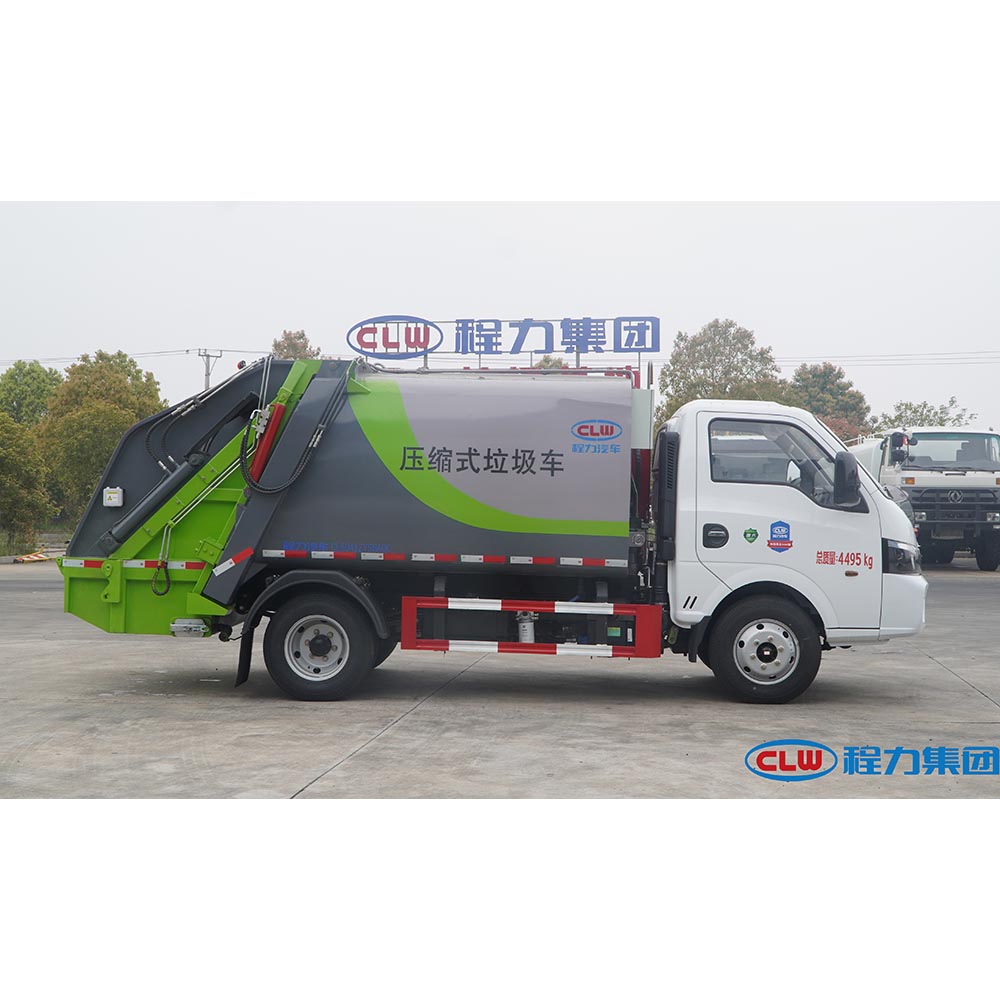
7. Comment les camions à ordures modernes sont-ils conçus pour une gestion efficace des déchets ?
Les camions à ordures modernes sont des merveilles d'ingénierie, conçus pour maximiser l'efficacité, la sécurité et la responsabilité environnementale. Ils intègrent des technologies et des caractéristiques avancées qui rationalisent le processus de collecte des déchets et minimisent leur impact sur l'environnement. Voici quelques éléments clés de la conception des camions à ordures modernes :
- Systèmes de compactage : La plupart des camions à ordures, à l'exception des camions à benne roulante, sont équipés de compacteurs hydrauliques qui compriment les ordures, augmentant ainsi la capacité du camion et réduisant le nombre de trajets vers le site d'élimination.
- Mécanismes de levage automatisés : De nombreux camions sont équipés de bras ou de fourches automatisés qui soulèvent et vident les conteneurs à déchets, réduisant ainsi le besoin de travail manuel et améliorant la sécurité des travailleurs.
- Suivi GPS et optimisation des itinéraires : Les camions à ordures modernes sont souvent équipés de systèmes de localisation GPS qui permettent aux entreprises de gestion des déchets de contrôler leur flotte, d'optimiser les itinéraires et d'améliorer l'efficacité.
- Carburants alternatifs et contrôle des émissions : Certains nouveaux camions à ordures sont alimentés par des carburants alternatifs, tels que le gaz naturel ou l'électricité, et sont équipés de systèmes avancés de contrôle des émissions afin de réduire leur impact sur l'environnement.
8. Quels sont les éléments à prendre en compte lors du choix d'une benne à ordures ménagères ?
Le choix du bon type de camion à ordures est crucial pour une gestion efficace des déchets. Plusieurs facteurs doivent être pris en compte lors de cette décision :
- Type de déchets : La première considération est le type de déchets à collecter. La collecte des déchets résidentiels nécessite généralement des camions à chargement arrière ou latéral, tandis que les déchets commerciaux sont souvent traités par des chargeurs frontaux. Les camions à benne basculante conviennent mieux pour les débris de construction et autres déchets en vrac.
- Volume des déchets : La quantité de déchets produits déterminera la taille et la capacité du camion nécessaire. Les zones à forte affluence peuvent nécessiter des camions plus grands ou des horaires de collecte plus fréquents.
- Itinéraire de collecte : Les caractéristiques de l'itinéraire de collecte, telles que la largeur de la rue, les schémas de circulation et l'accessibilité, influencent le choix du camion. Les rues étroites peuvent nécessiter des véhicules plus petits et plus maniables.
- Budget : Le prix d'achat initial, les coûts d'exploitation et les frais d'entretien doivent tous être pris en compte dans la décision.
- Considérations environnementales : Des facteurs tels que l'efficacité énergétique, les émissions et les niveaux sonores doivent être pris en compte, en particulier dans les zones urbaines.
Tableau : Facteurs à prendre en compte lors du choix d'un camion à ordures
| Facteur | Considérations |
| Type de déchets | Déchets résidentiels, commerciaux, de construction ou industriels ; matériaux recyclables ou non recyclables. |
| Volume de déchets | Quantité de déchets produits par cycle de collecte ; fréquence de la collecte. |
| Itinéraire de collecte | Largeur des rues, schéma de circulation, accessibilité, environnement urbain ou rural. |
| Budget | Prix d'achat, coûts d'exploitation (carburant, entretien), coûts de main-d'œuvre. |
| Impact sur l'environnement | Rendement du carburant, émissions, niveaux sonores, options de carburants alternatifs. |
| Réglementations locales | Toute réglementation ou restriction spécifique concernant la taille, le type ou l'utilisation des camions à ordures dans votre région. |
| Besoins futurs | Changements prévus dans le volume des déchets ou les exigences en matière de collecte ; possibilité d'expansion ou de diversification des services. |
| Technologie | Intégration avec le logiciel de gestion des déchets, suivi GPS, capacités d'optimisation des itinéraires. |
| Maintenance | Disponibilité des pièces et des services, facilité d'entretien, durée de vie prévue du véhicule. |
| Formation des opérateurs | Complexité du fonctionnement du camion, exigences en matière de formation des conducteurs et des opérateurs. |
| Compatibilité des conteneurs | Pour les camions automatisés ou semi-automatisés, compatibilité avec les conteneurs à déchets existants ou prévus. |
| Caractéristiques de sécurité | Caméras de recul, systèmes d'alerte, mécanismes de sécurité automatisés pour les bras, conception ergonomique pour la sécurité et le confort de l'opérateur. |
| Fabricant | Réputation et fiabilité du fabricant, garantie et assistance après-vente, disponibilité des options de financement. |
| Valeur de revente | Valeur de revente potentielle du camion après sa durée de vie utile, demande de camions à ordures d'occasion sur le marché. |
| Acceptation de la communauté | Perception par le public de l'apparence du camion, des niveaux de bruit et de l'impact sur l'environnement ; engagement de la communauté et retour d'information. |
En tant qu'usine de fabrication de bennes à ordures ménagères compressées, nous comprenons l'importance d'adapter le bon camion aux besoins spécifiques de nos clients. Nous travaillons en étroite collaboration avec les services municipaux d'assainissement, les agences de gestion des déchets et d'autres organisations afin d'évaluer leurs besoins et de recommander la solution de camion à ordures la plus adaptée.
9. Comment les camions à ordures contribuent-ils à un environnement plus propre et plus durable ?
Les camions à ordures sont essentiels au maintien de la santé publique et à la protection de l'environnement. En collectant et en transportant efficacement les déchets, ces véhicules jouent un rôle crucial dans la prévention de la propagation des maladies, la réduction de la pollution et la promotion d'un environnement plus propre et plus durable. Voici comment les camions à ordures contribuent à la protection de l'environnement :
- Détournement des déchets : De nombreux camions à ordures modernes sont conçus pour collecter séparément les matériaux recyclables, ce qui permet de les détourner des décharges et de promouvoir la conservation des ressources.
- Réduction des émissions : Les camions à ordures les plus récents sont souvent équipés de systèmes avancés de contrôle des émissions et peuvent être alimentés par des carburants alternatifs, ce qui réduit leur empreinte carbone et améliore la qualité de l'air.
- Prévention des fuites : Les camions à ordures sont conçus pour éviter les fuites et les déversements, ce qui garantit que les déchets sont transportés en toute sécurité et ne contaminent pas l'environnement.
- Contrôle des odeurs : Les camions modernes sont souvent équipés de dispositifs permettant de minimiser les odeurs, ce qui améliore la qualité de vie des communautés qu'ils desservent.
Je suis fier de dire que nos camions à ordures comprimés sont conçus dans le respect de l'environnement. Nous nous efforçons d'intégrer les dernières technologies et innovations afin de minimiser l'impact environnemental de nos véhicules tout en maximisant leur efficacité et leur performance.
10. Quelles sont les innovations qui façonnent l'avenir des camions à ordures ?
Le secteur de la collecte des déchets est en constante évolution, et les nouvelles technologies et innovations transforment la conception et le fonctionnement des camions à ordures. Voici quelques-uns des développements les plus intéressants :
- Camions-poubelles électriques : Les camions à ordures électriques gagnent en popularité en tant qu'alternative plus durable aux véhicules traditionnels à moteur diesel. Ils ne produisent aucune émission de gaz d'échappement et sont nettement plus silencieux, ce qui les rend idéaux pour les environnements urbains.
- Camions poubelles autonomes : Des camions-poubelles à conduite autonome sont en cours de développement et d'essai. Ils pourraient révolutionner la collecte des déchets en améliorant l'efficacité, en réduisant les coûts de main-d'œuvre et en renforçant la sécurité.
- Systèmes intelligents de gestion des déchets : L'intégration de capteurs intelligents, d'analyses de données et de logiciels d'optimisation des itinéraires permet d'offrir des services de collecte des déchets plus efficaces et plus réactifs.
- Matériaux avancés : L'utilisation de matériaux légers et très résistants dans la construction des camions permet d'améliorer le rendement énergétique et de réduire l'usure.
FAQ
Quel est le type de camion à ordures le plus couramment utilisé pour la collecte des déchets résidentiels ?
Le type de camion à ordures le plus courant pour la collecte des déchets résidentiels est le camion à chargement arrière. Sa conception permet un chargement efficace des déchets ménagers et son système de compactage optimise l'espace, ce qui le rend idéal pour les itinéraires résidentiels.
Comment fonctionnent les camions-poubelles à chargement latéral automatisé ?
Les camions à ordures à chargement latéral automatisé utilisent un bras robotisé pour saisir, soulever et vider les conteneurs de déchets compatibles dans la trémie du camion. Ce processus automatisé réduit le besoin de travail manuel et améliore l'efficacité.
Quels sont les avantages de l'utilisation d'un camion à ordures à chargement frontal pour les déchets commerciaux ?
Les camions à ordures à chargement frontal sont idéaux pour les déchets commerciaux car ils peuvent manipuler efficacement de grands conteneurs standardisés. Leur mécanisme de levage automatisé accélère le processus de collecte et réduit le risque de blessure pour les travailleurs.
Pourquoi les camions roll-off sont-ils utilisés pour les déchets de construction et de démolition ?
Les camions roll-off sont utilisés pour les déchets de construction et de démolition parce qu'ils peuvent transporter de grands conteneurs à toit ouvert pouvant accueillir des articles volumineux et des volumes importants de débris. Ces conteneurs peuvent être laissés sur place pour faciliter le chargement.
Quels sont les avantages des camions à ordures électriques ?
Les camions à ordures électriques offrent plusieurs avantages, notamment l'absence d'émissions de gaz d'échappement, des niveaux sonores réduits et des coûts d'exploitation moindres. Ils sont particulièrement bien adaptés aux environnements urbains où la qualité de l'air et la pollution sonore sont des préoccupations.
Existe-t-il des réglementations concernant l'exploitation des camions à ordures ?
Oui, il existe souvent des réglementations locales, nationales et fédérales concernant l'exploitation des camions à ordures. Ces réglementations peuvent porter sur des aspects tels que la taille du véhicule, son poids, les émissions, les niveaux de bruit et les dispositifs de sécurité. Il est important de connaître et de respecter toutes les réglementations applicables dans votre région.
Conclusion
- Les camions à ordures sont essentiels au maintien de la santé publique et d'un environnement propre.
- Il existe quatre principaux types de camions à ordures : les chargeurs arrière, les chargeurs frontaux, les chargeurs latéraux et les camions à benne basculante.
- Chaque type est conçu pour répondre à des besoins spécifiques en matière de collecte des déchets et offre des avantages uniques.
- Les camions à ordures modernes intègrent des technologies avancées pour une gestion efficace des déchets.
- Pour choisir le bon camion à ordures, il faut tenir compte de facteurs tels que le type de déchets, le volume, l'itinéraire de collecte, le budget et l'impact sur l'environnement.
- Des innovations telles que les camions à ordures électriques et autonomes façonnent l'avenir de la collecte des déchets.
- En tant que fabricant leader de bennes à ordures ménagères compressées, nous nous engageons à fournir à nos clients les solutions de gestion des déchets les plus avancées et les plus efficaces.
- Chengli Brand - Véhicule de transport de matériel de dynamitage est une excellente option pour ceux qui recherchent un camion à ordures fiable et efficace.
- Camion frigorifique haut de gamme est un autre excellent choix pour les entreprises qui doivent transporter des denrées périssables.
- Si vous êtes à la recherche d'un camion à ordures, je vous encourage à explorer les différents types de camions et à prendre en compte vos besoins spécifiques.
- Camion à ordures de 22 mètres cubes à chargement arrière est une option polyvalente et efficace pour une variété d'applications de collecte de déchets.
- Semi-remorque à ordures à compression 47m³ est conçu pour traiter de grands volumes de déchets, ce qui le rend idéal pour les municipalités et les grandes entreprises de gestion des déchets.
- Camion-poubelle purement électrique est une option respectueuse de l'environnement qui devient de plus en plus populaire.
Nous vous invitons à nous contacter pour en savoir plus sur nos produits et sur les avantages qu'ils peuvent apporter à votre organisation. Travaillons ensemble pour créer un avenir plus propre et plus durable.
